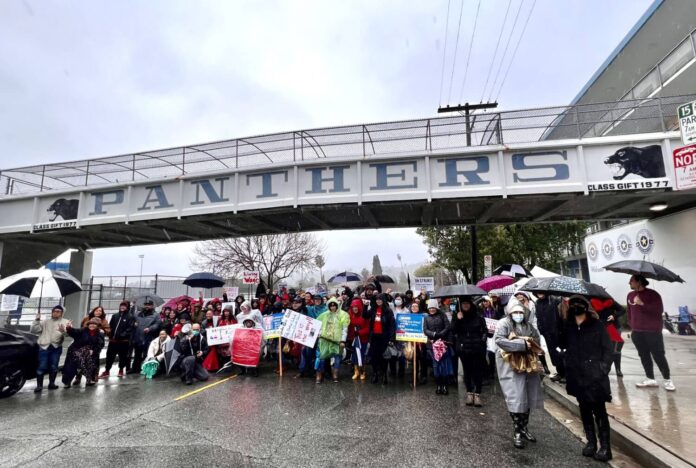“Funding Workers Funds Our Students” and “We Feed Our Students. Respect us! Pay us!” were among the many signs of demonstrators supporting last week’s Los Angeles Unified School District (LAUSD) strike that shut down campuses March 21-23.
Helene Smith, who works in special education at Rockdale Elementary School in Eagle Rock, said she got goosebumps and was brought to tears as she drove by shouting protestors on her way to picket at Rockdale, feeling a strong sense of solidarity.
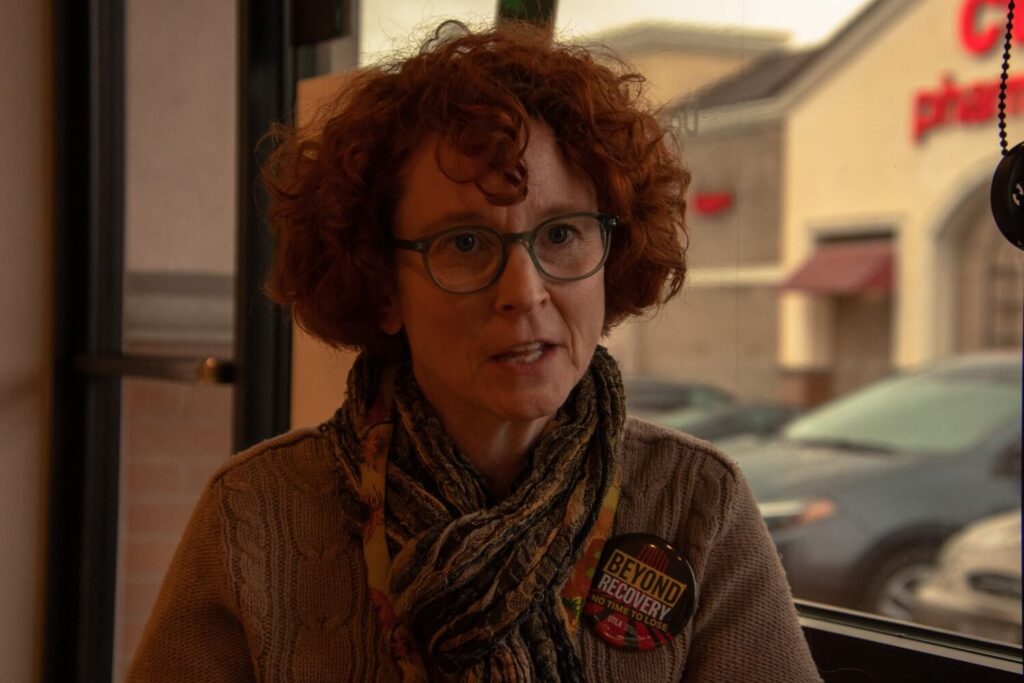
Monica Whalen, a teacher and union representative at Franklin High School in Highland Park, said that as she and others picketed in the rain, a mother brought them a huge pot of soup, while another community member gave them donuts and sweets.
Service Employees International Union (SEIU) Local 99 — which is comprised of approximately 30,000 custodians, bus drivers, cafeteria workers, teacher aids and other support staff in Los Angeles Unified School District (LAUSD) — led a 3-day strike against unfair labor practices. The United Teachers Los Angeles (UTLA), a labor union of more than 35,000 educators in LA, announced they would not work during the strike in solidarity with SEIU.
Jackie Goldberg, the LAUSD Board president and board member for District 5, which includes the Eagle Rock community, said they take claims of unfair labor practices seriously and are thoroughly investigating the allegations.
SEIU and LAUSD reached a tentative agreement March 24 that will provide union workers a 30 percent average wage increase, retroactive pay and expanded healthcare benefits, among other guarantees, according to the websites of SEIU and LAUSD.
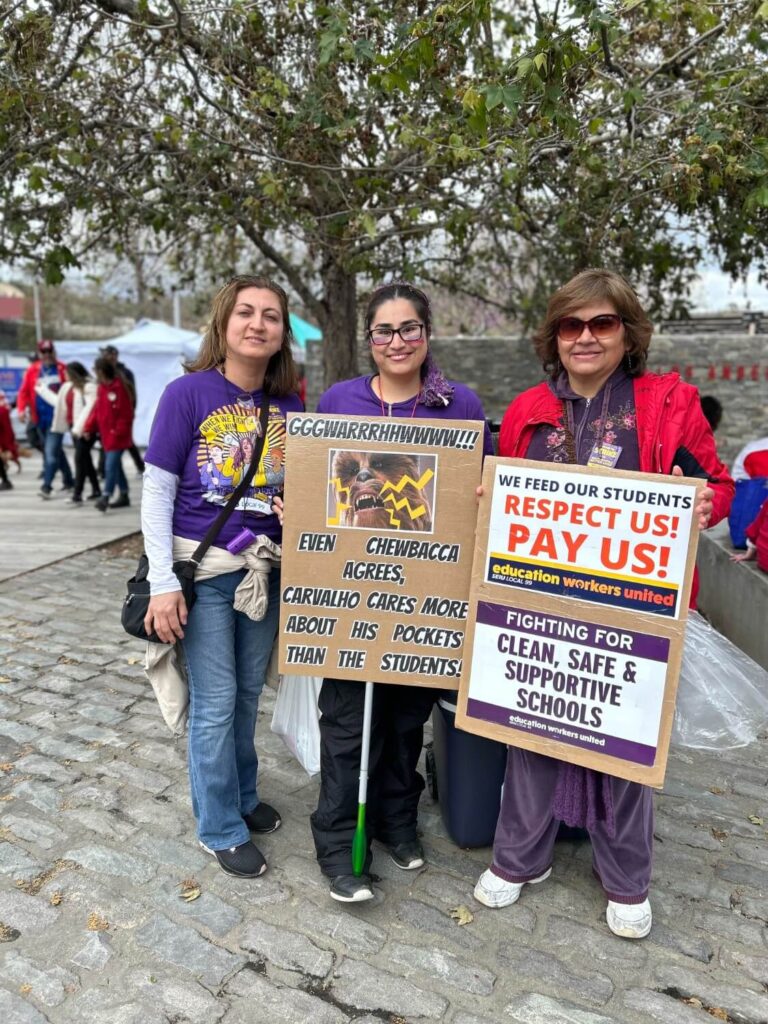
According to a statement from the SEIU Local 99 Executive Director, workers have recently experienced threats and interrogation for their participation in union activities.
During contract negotiations, some of the union’s demands were equitable wage increases, increased staffing levels and more full-time work, according to the union’s website.
Whalen said the cost of living in the Highland Park area severely impacts workers.
“If you’re making $19 an hour, and you want to live in Highland Park, that’s really expensive. And if you’re only getting three or four hours a day of pay, you can’t do it. It is so hard,” Whalen said. “I know a lot of our SEIU colleagues, and they can’t make rent, or they have to drive really far, or they have multiple people living in one house. It is very, very difficult for them to survive financially.”
Rocio Rivas, newly elected board member for LAUSD District 2, which includes parts of Highland Park, said she agreed that LAUSD employees deserved more, and at the same time, LAUSD had to keep its finances and future contracts with other labor partners in mind during negotiations.
“The teachers and the employees do deserve more — they do deserve more. They’re barely making ends meet. We’re living in high prices everywhere. Rents are going so high. Our gas is going high. Then, let’s help our workers,” Rivas said. “They deserve as much as we can give them.”
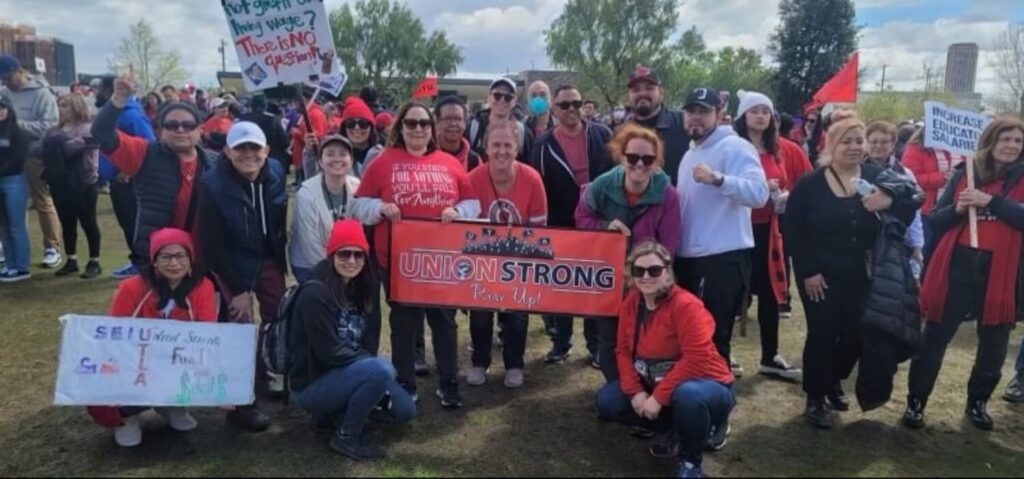
Smith said that there is a sense of community between teachers and other school staff. During this school year, her classroom ceiling fell in, and rainwater destroyed books, furniture, posters and other items she had put in the classroom for the emotional wellness of her students.
“I would not have my classroom pulled back together if it weren’t for the custodians that helped me through that, and were going and getting buckets and apologizing profusely,” Smith said. “Tony, our custodian, lead custodian, he’s like driving to Home Depot and buying these tarps, and getting people on the phone to get sandbags to put on the ceiling.”
Raven McCoy McManus, who does student counseling and advising at Robert F. Kennedy Community Schools, attended a rally at Los Angeles State Historic Park March 23. She said she wanted classified staff and teachers, meaning that they are not in a position that requires certification, to receive respect and higher wages.
“We work hard for the students and the family and the community, so that deserves to be reciprocated,” McCoy McManus said. “If we were able to have livable wages, that’d be amazing. We don’t yearn to be at the poverty line, like we would love to be above it.”
According to SEIU, the new agreement will increase the average income of a SEIU employee from $25,000 a year to $33,000. A livable wage for a person living in LA County without kids is about $21.22 per hour or about $42,440 per year. According to McCoy McManus, many part-time LAUSD employees have also not been able to access LAUSD health insurance. McCoy McManus said she hoped there would be better benefits following the strike.
“I’ve been in those shoes of like, just being a part-time worker,” McCoy McManus said. “You’re not a teacher, but you do so much, and it’s like, ‘Oh, man, like you can’t even go to the doctor.’”
Stephanie Yellin-Mednick, a school nurse and the district-wide UTLA lead chapter chair for nurses, who is completing her 42nd year with LAUSD, also attended a rally March 23 and said that showing solidarity to SEIU employees was important for several reasons.
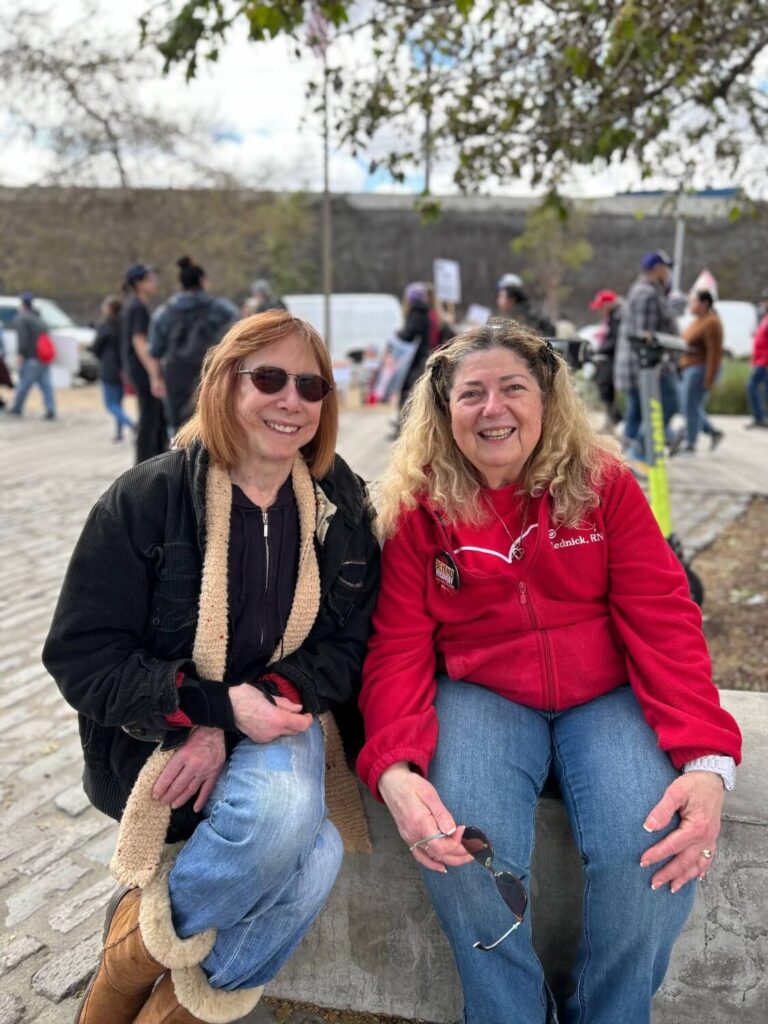
“First of all, because they are human beings,” Yellin-Mednick said. “Second of all, they work for the same employer as we do. They just happen to have different job classifications and titles, and they make less than we do. But they are people. And we’re here because they’re union, and we’re union, and unions support each other.”
During the strike, LAUSD offered students and families Grab & Go meal kits and digital learning resources, according to the LAUSD website. Goldberg acknowledged the strike’s impact on families.
“I know it was challenging for many families to accommodate three days of school closures,” Goldberg said via email. “I also know that our district’s families support our decision to finalize a contract that reflects the importance of our personnel in their children’s educational experience.”
Brenda Del Hierro, a communications co-chair for Eagle Rock Elementary Parent Teacher Association, said all the parents she had talked to supported the strike, and her children, who are attending LAUSD schools in Eagle Rock and Highland Park, knew of its importance.
“They both walked the line in 2019 and understand the importance of the strike,” Del Hierro said via email. “They both see the needs at their schools, and understand why staff was asking for more money.”
Rivas said the financial hardships affecting employees also impact students.
“If we have a special education [aide] who’s stressed out, who’s going to be homeless soon and can’t pay their bills, you think they’re gonna be in the right state of mind to help this child?” Rivas said.
College students also showed support toward the strike. Fiona Baler, a student at Pitzer College, attended a rally March 23 after keeping up with strike-related events on social media.
“I wanted to support my community and show up for workers demanding better conditions,” Baler said via email. “It is such an amazing and empowering thing to see so many people committed to fighting for a better reality at such a large scale.”
Baler said they grew up in LA and had attended public schools in Glendale, Pasadena and Claremont, so the issue felt personal.
“My dad is a professor at Cal State LA, and I grew up with him striking every year to fight for better wages, so this is something that has always been important to me,” Baler said via email. “I also attended public schools in LA County, and so I grew up in a climate where teachers and education workers were not being paid a livable wage, and as a student, I also felt the impacts.”
Rivas said the strike indicates deeper societal issues.
“We’ve underfunded our schools, and this is why we’re in this position,” Rivas said. “Let’s talk about the system that is perpetuating this, that’s not giving our money that we need for our schools, period.”
Contact Jude George at sgeorge@oxy.edu
![]()































